US not suffering from ‘stagflation’, says Fed chairman Jerome Powell
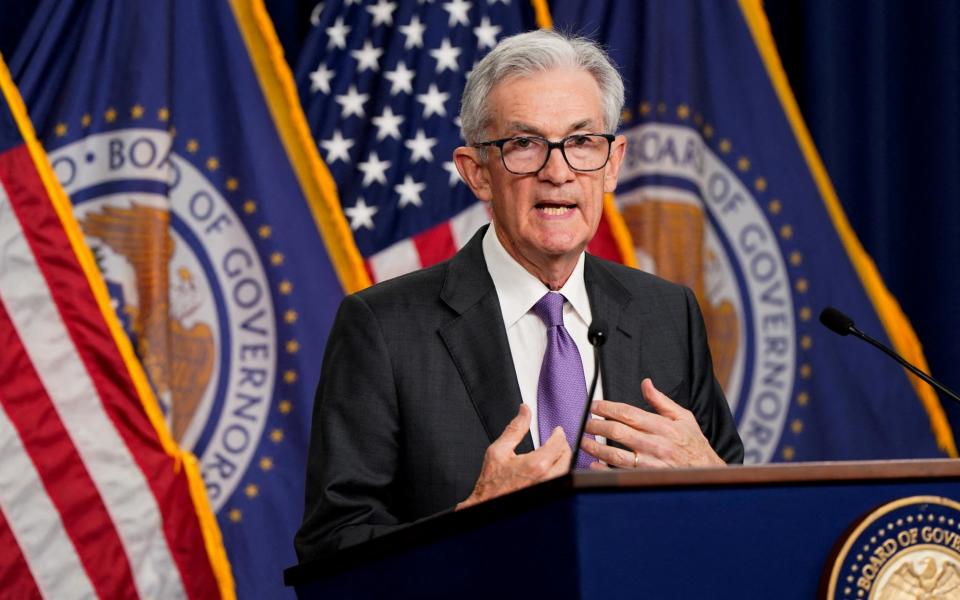
The US is not suffering from “stagflation” and is growing well despite stubborn inflation, Federal Reserve chairman Jerome Powell has said.
Mr Powell on Wednesday night dismissed suggestions that the US was close to an economic trap of stagnant growth and rampant inflation, saying the economy was among the best in the world and the rate of price rises was on track to fall to the Fed’s 2pc target.
The central bank chief added that it was “unlikely” the Fed would need to raise interest rates any higher to combat inflation, in comments that raised hopes borrowing costs have peaked and will soon be on the way down.
Stock markets rallied after Mr Powell’s statements, which took investors by surprise. Most had expected him to signal that the Fed was still willing to put up borrowing costs if necessary after a recent run of strong economic data.
The S&P 500, the Dow and the tech-heavy Nasdaq indexes all jumped by more than 1pc on Wall Street following Mr Powell’s press conference comments.
Josh Jamner, a strategist at ClearBridge Investments in New York, said: “Many investors were positioned for, and fearful of, a more hawkish bent after a string of hot inflation prints so far this year.”
Mr Powell’s rosier-than-expected assessment of the US economy will raise hopes that interest rates will soon begin falling around the world. The Bank of England’s Monetary Policy Committee meets next week, with division on the nine-person board over when to lower rates.
The Bank’s panel of rate-setters is expected to hold borrowing costs at 5.25pc, even as many analysts believe inflation will have fallen below 2pc in April.
The Fed on Wednesday held US interest rates at a 23-year-high range of 5.25pc to 5.5pc.
Mr Powell said it was still too early to declare victory against inflation after “a lack of further progress”. US inflation rose for the second month in a row in March to reach 3.5pc and Mr Powell said it was “likely to take longer for us to gain confidence that we are on a sustainable path” towards 2pc inflation.
He added that other central banks around the world were likely to cut interest rates before the US, given weaker growth rates elsewhere, but said this was unlikely to create economic problems as it has in the past.
Asked about concerns that the US economy was at risk of “stagflation”, the Fed chief told reporters in Washington: “Right now we have 3pc growth, which is pretty solid I would say by any measure, and we have inflation running under 3pc. I do not see the ‘stag’ or the ‘flation’.”
Market commentators last week raised fears of “stagflation” following weaker-than-expected growth in the first three months of the year coupled with surprisingly strong core inflation.
However, new figures on Wednesday showed that job openings fell to a three-year low in March, a sign that inflationary pressures from a tight labour market are easing.
Oil prices are also dropping rapidly, which should ease pressure on fuel prices around the world. Brent crude, the international benchmark, has fallen 6.6pc to $83.51 a barrel over the last three days, amid hopes of a ceasefire in the Israel-Gaza conflict.
While the US economy is performing well, fresh data on Wednesday raised concerns about the strength of Britain’s economic recovery from the recession suffered at the end of last year.
Manufacturing businesses reported a fall in activity in April, according to S&P Global’s influential purchasing managers’ index survey.
Output had risen in March for the first time in more than a year but the latest figures suggest factories are struggling to create momentum.
Companies are also facing the sharpest rise in costs since February of 2023, the survey found, and they are attempting to pass this on to customers, with prices charged to clients also accelerating.
07:09 PM BST
Thanks for joining us today...
We’ll be back in the morning on the Markets blog covering all the latest from the stock market and beyond. In the meantime, do check out some of our latest stories elsewhere at The Telegraph:
Anglo takeover attempt triggers corruption claims against South Africa’s ruling party
Labour waters down late-night work email ban championed by Angela Rayner
07:02 PM BST
Fed keeps holds rates amid ‘solid pace’ of economy
The Federal Reserve has voted to keep US interest rates the same. In a statement, it said:
Recent indicators suggest that economic activity has continued to expand at a solid pace. Job gains have remained strong, and the unemployment rate has remained low. Inflation has eased over the past year but remains elevated. In recent months, there has been a lack of further progress toward the Committee’s 2 percent inflation objective.
The Committee seeks to achieve maximum employment and inflation at the rate of 2 percent over the longer run. The Committee judges that the risks to achieving its employment and inflation goals have moved toward better balance over the past year. The economic outlook is uncertain, and the Committee remains highly attentive to inflation risks.
In support of its goals, the Committee decided to maintain the target range for the federal funds rate at 5-1/4 to 5-1/2 percent.
06:42 PM BST
Fed expected to hold rates amid fears of sticky inflation
The world’s largest central bank is expected to refrain from cutting interest rates amid growing concerns of sticky inflation in the US.
The Federal Reserve’s rate-setters will at 7pm announce whether they have yet again held the benchmark rate at a 23-year-high of 5.25pc to 5.5pc.
Traders will be listening closely to Chair Jerome Powell for any hints on whether he is expecting any rate cuts at all this year.
Markets have radically reassessed anticipations of lower borrowing costs and are now only fully pricing in one cut in 2024.
This is down from as many as six at the end of last year.
In a sign that inflationary pressures from a tight labour market are easing however, new figures on Wednesday showed that job openings fell to a three-year low in March.
06:16 PM BST
The 40mph ‘death trap’ e-bikes wreaking havoc on Britain’s streets
Powerful e-bikes that reach speeds of nearly 40mph are being ridden illegally across Britain because of a lack of effective policing, motorcycle manufacturers have claimed. Matt Oliver has the details:
In a warning to the Government, an industry group representing Honda, Yamaha, BMW and others said a failure to enforce the law properly had led to “widespread” use of e-bikes that technically qualify as mopeds and should only be ridden with a licence.
The rise of these two-wheelers – which are often advertised by some companies as “street legal” – is eating away at motorcycle sales while creating a dangerous situation on the roads, they said.
At the same time, manufacturers are concerned that it is overly complicated for prospective riders to secure licences for mopeds and motorcycles.
Ahead of a meeting with ministers next week, motorcycle companies have written to Mark Harper, the Transport Secretary, urging him to launch a “full-scale review” of licensing.
05:59 PM BST
Protesters challenge Unilever over ESG
Protesters interrupted Unilever’s annual general meeting today in an attempt to confront the board over the company’s impact on the planet.
The Marmite and Dove owner is considered a trailblazer in environmental, social and governance (ESG) performance but it recently came under fire for reducing the scale of its targets and extending some deadlines.
The leadership team, which has undergone several changes in the last year, also published a new growth strategy aimed at driving greater shareholder returns after a “disappointing” performance over the last few years.
Shareholders voted in favour of all the resolutions at the AGM on Wednesday, with 98pc backing its newly updated Climate Transition Action Plan.
Before the AGM started, dozens of protesters lined the street outside the Hilton Bankside London, holding placards reading “Unilever: Stop greenwashing” and “No economy on a dead planet”.
Inside, chairman Ian Meakins’s opening remarks were immediately interrupted by Greenpeace activists, who set off a confetti canon and presented an open letter with 140,000 signatures to the board calling for it to ditch single-use plastics.
As security staff escorted them out, one woman addressing Unilever’s chief executive, shouted: “Hein Schumacher, you and your board are cheap plastic polluters, responsible for the mess that we are in today. You have to change.”
Shareholder questions were dominated by ESG concerns over climate change, consumer health and the firm’s continued presence in Russia.
But the board insisted that sustainability remains “at the heart” of the business as it outlined its new focus on driving performance.
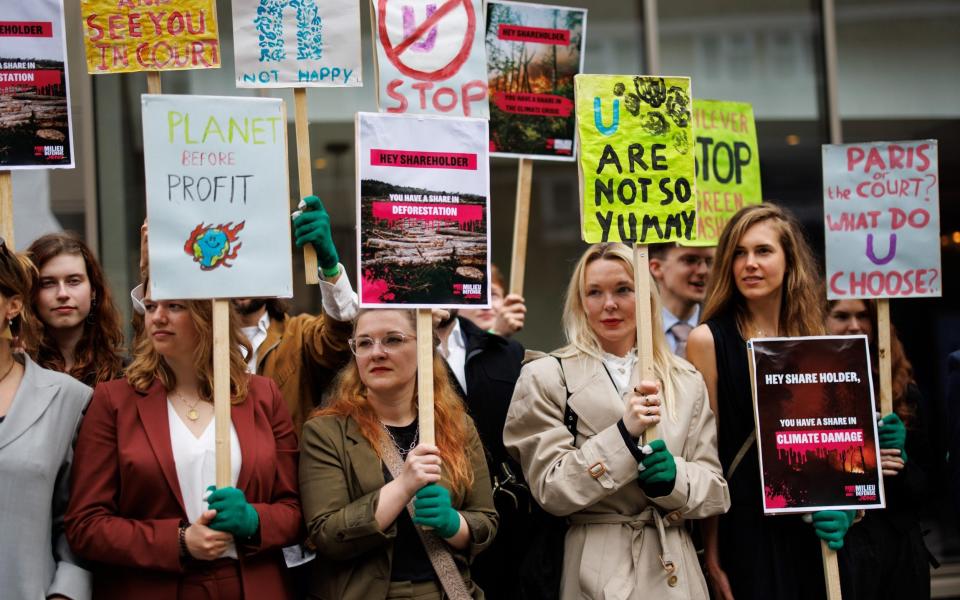
05:11 PM BST
Pizza Hut-owner Yum Brands suffers first sales fall since 2020
The owner of KFC and Pizza Hunt reported its first drop in sales since the pandemic closed restaurants as customers turned to cheaper meals at home.
Sales at Yum Brands worldwide fell 3pc to $1.60bn (£1.3bn) in the first quarter, while analysts were expecting a growth of 0.04pc.
David Gibbs, chief executive, said: “As expected, same-store sales were pressured this quarter, but we are encouraged by strong two-year same-store sales growth and positive momentum exiting the quarter.”
The launch of KFC’s first-ever loyalty program failed to boost demand for the fast food giant. This comes in contrast to results at pizza chain Domino’s, which reaped benefits from a revamped loyalty programme that has kept consumers hooked over the last two quarters.
04:54 PM BST
Footsie closes down
The FTSE 100 closed down 0.28pc. The biggest riser was drug giant GSK, up 1.9pc, followed by student accommodation provider Unite Group, up 1.3pc. The biggest faller was JD Sports, down 3pc, followed by industrial equipment rental company Ashtead, down 2.9pc.
Meanwhile FTSE 250 closed down 0.29pc. The biggest riser was investment platform AJ Bell, up 3.6pc, followed by aerospace supplier Chemring, up 3.3pc. The biggest faller was Aston Martin, down 6.8pc, followed by online gaming and sports betting software Playtech, down 4.9pc.
04:44 PM BST
Cocoa market melts from record highs
Cocoa prices have fallen sharply since striking recent historic peaks as investors fear the market has become overpriced and could become illiquid, analysts warn.
The commodity, mostly used to make chocolate, had soared on April 19 as high as $11,722 per tonne in New York and £9,285 per tonne in London, driven by supply fears following bad weather in top producers Ghana and Ivory Coast.
Cocoa has since tumbled by more than a quarter in value and traded at $8,408 in New York and £6,783 in London on Wednesday.
Ole Hansen, a Saxo Bank analyst, told AFP:
The extreme price swings and volatility seen in recent months have seen traders and investors increasingly abandon the market, simply because it’s too difficult to trade and too expensive to hold positions.
This has left the market with a liquidity problem...
Poor liquidity has created an erratic price action which has meant that a lot of traders have either closed or reduced their exposure.
The recent spike in cocoa prices had sparked worries over the knock-on impact on the retail price of chocolate, at a time when the world’s major economies are already grappling with elevated inflation.
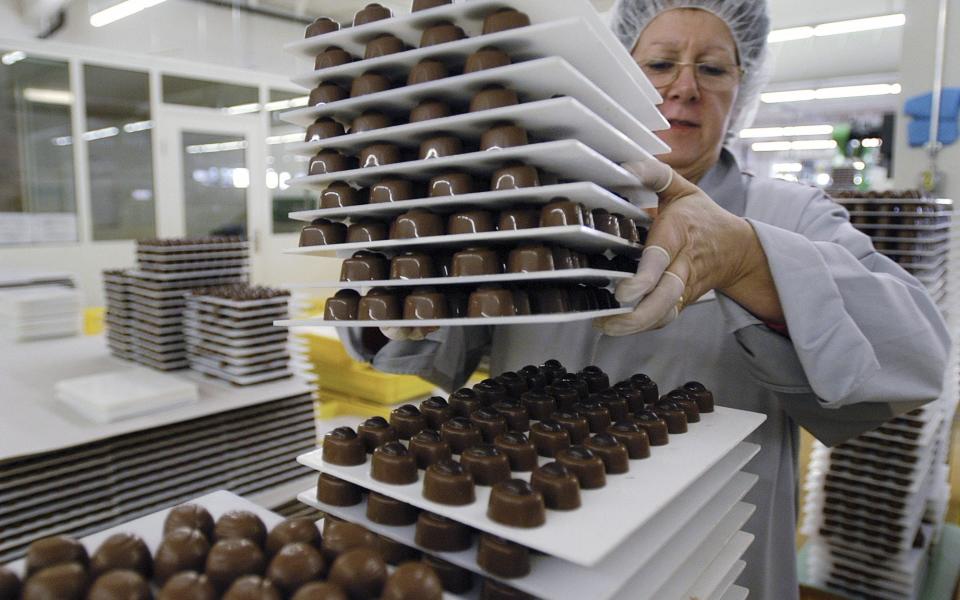
04:22 PM BST
Major banks see income more than double from cash held with the bank of England
Four of the UK’s biggest banks have received more than £9bn in interest on cash held at the Bank of England, more than double the amount the previous year, according to new data.
The UK’s Treasury Committee said the data showed a “staggering scale of unanticipated income high street banks are bringing in” thanks to higher interest rates.
The Bank of England bought £895bn worth of bonds as part of efforts to boost the economy after the global 2008 financial crisis.
This was done using quantitative easing, where the Bank effectively creates more money digitally in the form of central bank reserves.
With UK interest rates currently at 5.25pc, it means the reserves have generated more income for the banks since rates started rising at the end of 2021.
Dame Harriett Baldwin, chair of the Treasury Committee, said:
I am pleased to see some effort is being made to pass through competitive rates for our constituents and that consumers are shopping around more.
What this data also shows is the staggering scale of unanticipated income high street banks are bringing in, with no work required, as a result of increased interest rates.
Although the committee raised a number of concerns about the losses now being incurred by quantitative easing and tightening, we concluded that the goalposts should not be moved for lenders now that bond sales are running at a loss.
04:08 PM BST
Denmark to restrict Ozempic prescriptions in blow to company that saved it from recession
Denmark is placing new restrictions on Ozempic prescriptions, as the country prepares to move patients to cheaper drugs in a setback for national champion Novo Nordisk. Hannah Boland reports:
The Danish Medicines Agency said it was cutting subsidies for Novo Nordisk’s Ozempic drugs, meaning that people with type 2 diabetes will first need to try cheaper alternatives.
Ozempic is a diabetes drug but it is also used off-label to treat obesity, with demand for the jabs having ballooned in recent years.
Last year, Denmark’s public health system doubled its spending on Ozempic to $200m (£160m), equal to 8pc of the country’s entire medicine costs.
The treatment has been priced at $188 per month in Denmark, although it was reduced this week to $125 a month.
The price reduction saves the Danish government more than $70m a year.
Denmark is expected to make further savings by tightening its rules around who will receive Ozempic, although people will still be prescribed it if other treatments do not work.
The cut to subsidies means that around half of the people prescribed the treatment are set to be moved onto cheaper alternatives.
The new regulation is expected to be introduced in November.
It follows restrictions on the drugs in the UK, as doctors were told last year to stop prescribing Ozempic to anyone who does not have type 2 diabetes amid shortages.

03:42 PM BST
US factory output shrank last month
US manufacturing activity edged down last month, slipping back into contraction according to an industry survey released today, as investors await a Federal Reserve decision on interest rates.
The country’s manufacturing sector has shown weakness after the US central bank rapidly lifted interest rates in recent years to rein in runaway inflation.
But factory activity expanded in March for the first time since September 2022.
In April, the Institute for Supply Management’s (ISM) manufacturing index dropped back below the 50-point mark separating expansion from contraction.
The index came in at 49.2 percent last month, well below March’s reading of 50.3 percent.
This was also lower than analyst expectations of a 50.0 percent figure, according to Briefing.com.
03:35 PM BST
Pictured: Monkey business criticised at Whole Foods Market
Protesters wearing monkey masks and prisoner outfits descended on The Whole Foods Market store on Kensington High Street in London today to demonstrate against its choice of suppliers.
The “monkeys” from animal charity PETA criticised the supermarket giant for continuing to sell coconut milk from Thailand, where it said the coconut industry is driven by the forced labour of pig-tailed macaques.
The supermarket has been contacted for comment.
I will sign off at this point and leave you in the hands of Alex Singleton, who will keep you up to speed on the Federal Reserve’s interest rate decision later as well as all the other vital business news.
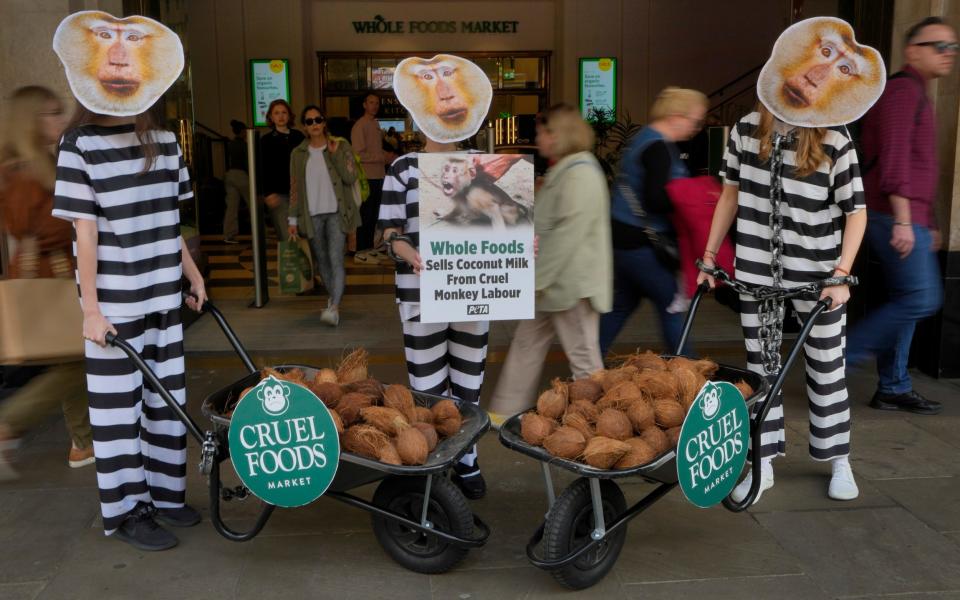
03:17 PM BST
Fed poised to hold interest rates steady for sixth straight meeting
The US Federal Reserve has opened the second day of its key policy meeting, where it is expected to hold interest rates steady for a sixth straight time to curb stubborn inflation.
For months, the US central bank has maintained its benchmark lending rate at a 23-year high to cool demand and rein in price increases - with a slowdown in inflation last year fueling optimism that the first cuts were on the horizon.
But inflation has accelerated, and analysts widely believe the rate-setting Federal Open Market Committee (FOMC) will keep its target range at 5.25pc to 5.5pc.
The committee’s meeting began as scheduled early today, a Fed spokesman said.
As hope dwindles for rate cuts in the first half of the year, the Fed also faces a growing possibility that eventual reductions will coincide with the run-up to November’s presidential election.
This could give the economy a boost while Democrats and Republicans vie to win over voters. The converging timeline may prove uncomfortable given that the Fed, as the independent US central bank, seeks to avoid any appearance of politicisation.
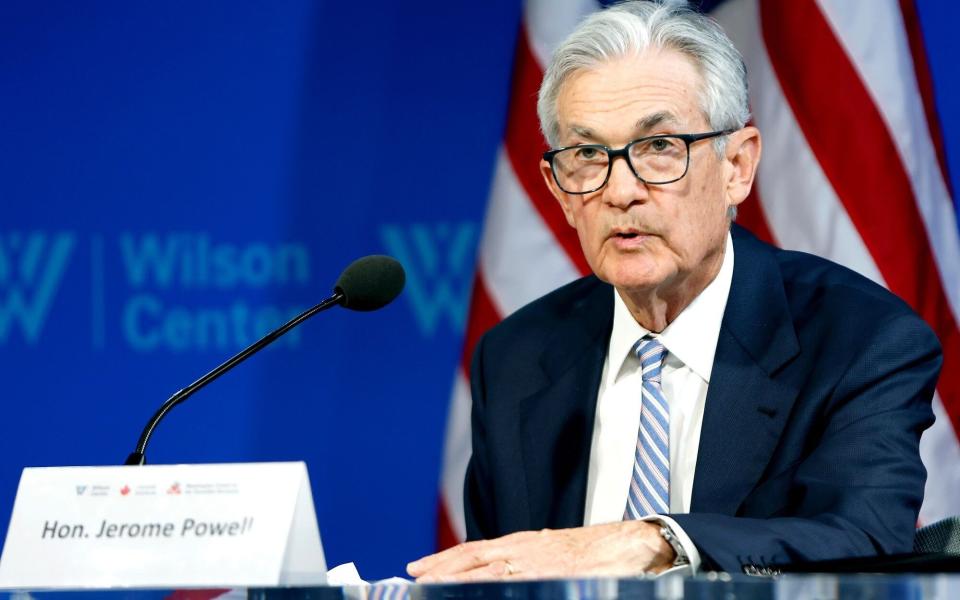
02:56 PM BST
Starbucks plunges as consumers cut back on costly coffee
More than $15.4bn (£12.3bn) was wiped off the value of Starbucks as trading began on Wall Street after it revealed sales fell for the first time since the beginning of the pandemic.
The coffee giant’s shares plunged by 15pc after the opening bell as its new lavender lattes and half-price deals were not enough to entice consumers.
It said net revenues fell by 2pc to $8.6bn (£6.9bn) in the first three months of 2023, as it cut its full-year revenue growth forecast to the low single digits.
Chief executive Laxman Narasimhan said:
In a highly challenged environment, this quarter’s results do not reflect the power of our brand, our capabilities or the opportunities ahead.
It did not meet our expectations, but we understand the specific challenges and opportunities immediately in front of us.
We have a clear plan to execute and the entire organization is mobilised around it. We are very confident in our long-term and know that our Triple Shot Reinvention with Two Pumps strategy will deliver on the limitless potential of this brand.
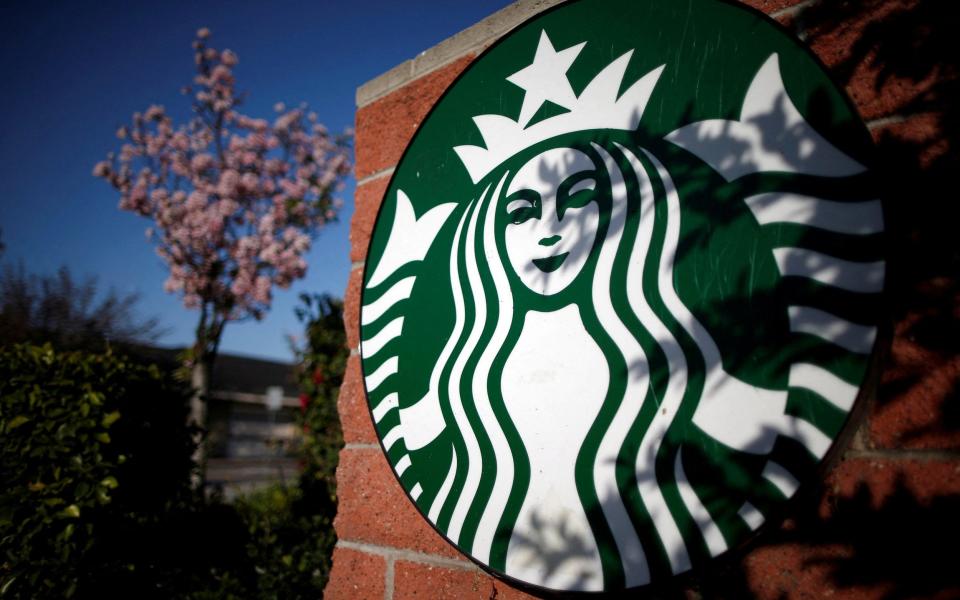
02:35 PM BST
Wall Street mixed ahead of interest rate decision
The S&P 500 and Nasdaq opened lower as chip stocks led losses after downbeat results.
The S&P 500 fell 6.7 points, or 0.1pc, at the open to 5,029.03​, while the Nasdaq Composite dropped 11.7 points, or 0.1pc, to 15,646.094 as markets exercised caution ahead of more economic data and the Federal Reserve’s interest rate decision.
The Dow Jones Industrial Average rose 29.6 points, or 0.1pc, at the open to 37,845.56.
02:31 PM BST
Gas prices fall as wind power poised to recover
Britain’s natural gas prices have sunk as increased wind power lowered demand for the fossil fuel.
Day-ahead prices dropped as much as 4.1pc while month-ahead prices dropped as much as 2.8pc. The declines were ahead of falls in Europe’s benchmark contracts.
It comes as output from Britain’s fleet of wind turbines is forecast to pick up on Thursday, just as supplies from the UK’s natural gas terminals have increased.
02:10 PM BST
J&J proposes £5.2bn settlement to talc cancer lawsuits
Johnson & Johnson will ask thousands of people whether they will accept a settlement of nearly $6.5bn (£5.2bn) to end lawsuits alleging that its baby powder and other talc products contain asbestos and cause ovarian cancer.
The cases filed against J&J prompted the company to stop selling its talc-based products in 2020. In 2022, J&J announced plans to cease sales of the product worldwide.
The deal would allow it to resolve the lawsuits through a third bankruptcy filing of a subsidiary company.
It will begin a three month voting period in hopes of reaching consensus on a settlement of all current and future ovarian cancer claims.
J&J said that the plan would resolve 99.75pc of all pending talc lawsuits against it and its affiliates in the US.
The remaining pending personal injury lawsuits that relate to mesothelioma will be addressed outside of the plan. The company said that it has already resolved 95pc of mesothelioma lawsuits filed to date.
Shares rose more than 2pc before the market open.

01:47 PM BST
Pfizer profits fall as it turns corner from Covid products
Pfizer reported a drop in profits amid lower sales of Covid-related products and cost cuts.
Profits were down 44pc to $3.1bn (£2.5bn) after much lower sales of Covid-19 vaccine Comirnaty and therapeutic Paxlovid led to a 20pc drop in first-quarter revenues to $14.9bn (£11.9bn).
The drugmaker said it had enjoyed increased sales of oncology products, in part driven by the acquisition of Seagen, which was completed in December.
Other products with significant growth included Vyndaquel, which is used to treat nerve disease; Eliquis, which treats blood clots; and Prevnar, a vaccine for pneumonia.
Meanwhile, Pfizer said it will deliver “at least” $4bn in savings by the end of 2024.
The company, which raised its earnings per share projection, has maintained a shareholder dividend. However, it plans no share repurchases in 2024 and will instead pump funds back into research and development to support the drug pipeline.
Shares of Pfizer rose 1.3pc in pre-market trading.

01:34 PM BST
US economy adds more jobs than expected
The US economy added more jobs than expected in April in a further blow to hopes of early interest rate cuts by the US Federal Reserve.
Private employers added 192,000 staff during the month, according to the ADP Research Institute, which was more than the 183,000 that had been forecast by economists.
The figure for March was also revised higher from 184,000 to 208,000 in a sign that the labour market is still tight, which could help to fuel inflation as it gives staff greater ability to demand pay rises.
ADP chief conomist Nela Richardson said: “Hiring was broad-based in April. Only the information sector — telecommunications, media, and information technology — showed weakness, posting job losses and the smallest pace of pay gains since August 2021.”
United States ADP Employment Changehttps://t.co/LOS8b95mlz pic.twitter.com/JgJn9a9Fc8
— TRADING ECONOMICS (@tEconomics) May 1, 2024
01:22 PM BST
Domino’s Pizza to open more sites as customers order via app
Domino’s Pizza revealed a surge in customers using its app as the food delivery chain eyes more store openings in 2024.
The company said its sales dipped 0.4pc to £385.1m in the first three months of the year, compared with the same period last year.
The total number of orders slipped by 1.8pc to 17.7m but the number of customers using the Domino’s app soared by 37pc compared with the previous year.
The proportion of orders made through the app was more then 11 percentage points higher than the previous year.
The company said sales picked up in February and March after a slow January, which it previously said was a typically quieter month for the group.
Domino’s is planning to open more than 70 new stores this year as it continues to eye expansion after opening about 60 shops last year.
The company previously said it was targeting 1,600 stores in the UK and Ireland by 2028, and 2,000 by 2033.
Chief executive Andrew Rennie said: “I’m excited by the momentum we have in the business.”

01:02 PM BST
OnlyFans investigated over fears it has exposed children to pornography
OnlyFans is under investigation by regulators over fears the website has allowed children to watch pornography.
Our reporter James Warrington has the details:
Ofcom has opened an investigation into the subscription service, which is known for hosting adult content, over concerns it has not done enough to enforce age verification on its site.
In 2020, the watchdog introduced regulations that require UK video-sharing platforms to take appropriate measures to protect children from harmful material, including pornography and illegal videos such as terrorist content.
OnlyFans sets a minimum age of 18 and requires users to provide their name and payment details, as well as using digital identity platform Yoti, which scans the user’s face and estimates their age.
Read why Ofcom said it had grounds to suspect that OnlyFans has not implemented its age verification process sufficiently.
12:48 PM BST
KFC owner’s sales fall for first time in four years
KFC owner Yum! Brands revealed sales fell for the first time since the depths of the pandemic in 2020 in a sign that consumer spending is weakening.
Revenue declined by 2.9pc in the first three months of the year, with same store sales at KFC down 2pc amid a slowdown in the US.
In a sign consumers are becoming more frugal, McDonald’s revealed lower than expected sales on Tuesday, while Starbucks also reported falling revenues for the first time since 2020.
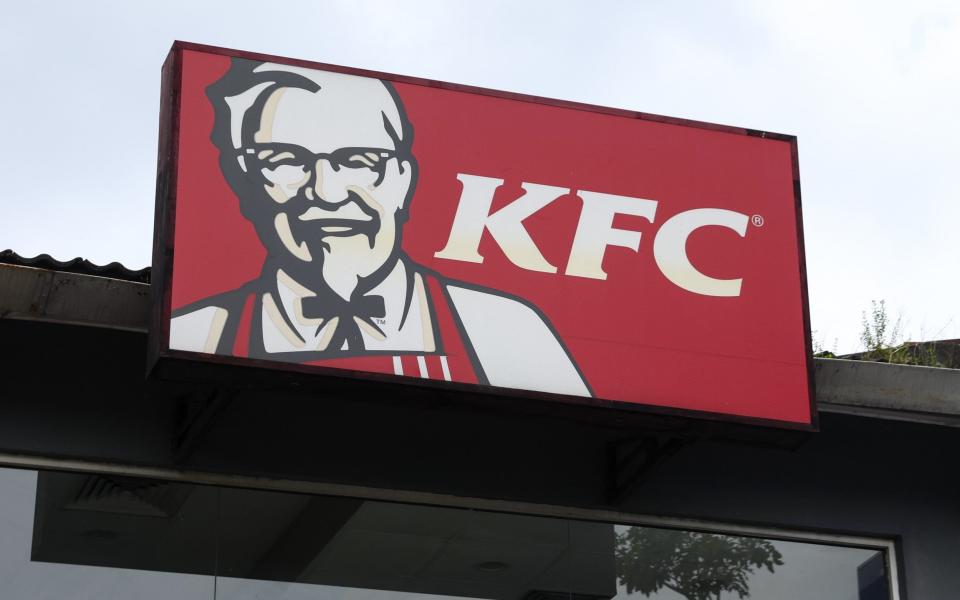
12:33 PM BST
US tech tycoon backs Tony Blair in $1bn ‘bet on Britain’
One of the world’s richest men will create tens of thousands of UK jobs as part of a $1bn “bet on Britain” that will see cash poured into creating batteries and fighting superbugs.
Our economics editor Szu Ping Chan has the details:
Larry Ellison, the founder of American software giant Oracle, announced last year that he was building a new research institute in Oxford to “help solve the world’s great problems”.
The Ellison Institute of Technology (EIT) in Oxford, which is being headed by Sir John Bell, is working with former Labour prime minister Sir Tony Blair to create homegrown companies worth billions of pounds.
“It’s absolutely a bet on Britain,” said Sir John, who is known for his role in steering the Covid vaccine rollout.
Read why the world’s fifth-richest man has been drawn to Britain.
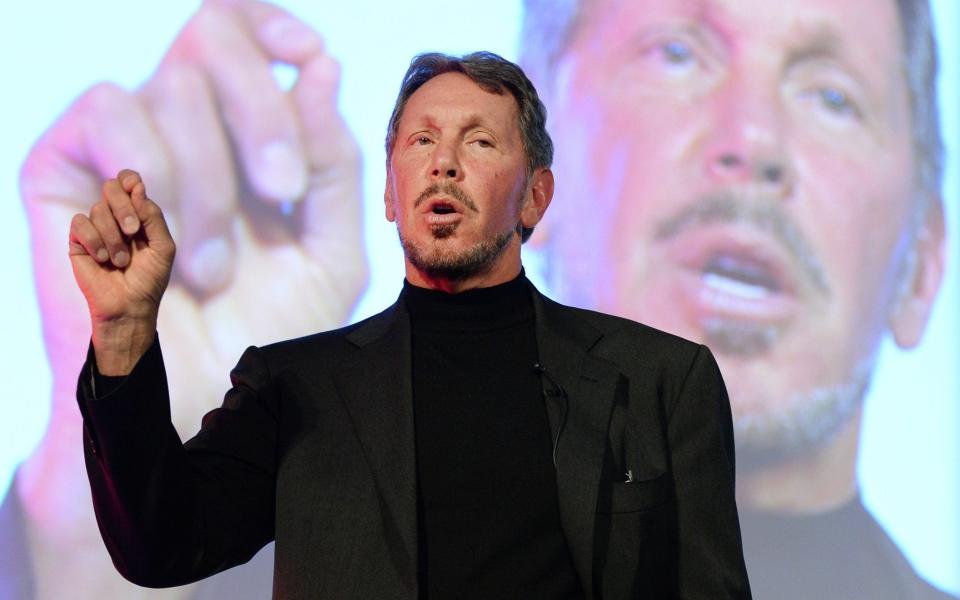
12:07 PM BST
Wall Street on track to fall ahead of Fed rate decision
US stock indexes are on track to lose ground when trading begins later as markets exercise caution ahead of the Federal Reserve’s interest rate decision.
US stocks ended lower on Tuesday as data showing a rise in labour costs and deteriorating consumer confidence dampened rate-cut expectations.
Money markets expect the US central bank to hold rates steady today and are pricing in just one rate cuts this year, down from around six at the start of 2024, according to LSEG data.
A sharp pullback in rate cut bets and tensions in the Middle East made April a rough month for US stocks, with all three major indexes posting their first monthly loss in six.
Meanwhile, Advanced Micro Devices shed 6.3pc in premarket trading after its forecast for AI chip sales failed to impress investors.
Super Micro Computer lost 9.1pc as the artificial intelligence server maker reported third-quarter revenue below estimates.
Other chipmakers also traded in the red, with Nvidia and Micron Technology down more than 2pc each.
Ahead of the opening bell, the Dow Jones Industrial Average was down 0.2pc, the S&P had fallen 0.4pc and Nasdaq 100 futures were 0.7pc lower.
11:55 AM BST
Flutter shareholders vote to move main listing to New York
Shareholders in Paddy Power owner Flutter have voted to move the company’s primary listing from London to New York in a blow to the UK stock market.
The company will maintain a secondary listing in London, with the move due to happen by the end of this month.

11:39 AM BST
Mulberry sales slump as Chinese shoppers cut back
Mulberry has revealed a hit to full-year sales as luxury shoppers cut back on their spending, particularly in China.
The British high-end handbag maker reported a 4pc drop in group revenues for the year to March 30 as it said trading conditions worsened in the final three months.
It said the sales fall came “against a backdrop of challenging macro-economic conditions and a decline in luxury consumer spending”.
In the UK, retail sales dropped 3.2pc, while it said trading in China was also impacted by economic uncertainty in the country and fewer numbers of luxury shoppers visiting stores in the region.
Somerset-based Mulberry warned that there was no immediate end in sight to the UK and China trading woes.
It also reiterated its warnings over annual losses as it counts the cost of expansion across Sweden and Australia, as well as investment in areas such as IT.
Shares in the group slumped as much as 11.6pc after the gloomy update.

11:18 AM BST
Scotland on brink of recession with SNP in chaos
Scotland is at risk of falling into recession, official figures show, days after First Minister Humza Yousaf threw its government into chaos by announcing he will resign.
Scotland’s economy is estimated to have shrunk by 0.3pc in February, figures from the Scottish Government show.
It comes after GDP data for the final three months of 2023 showed the economy shrank by 0.5pc - although this was an improvement on a previous estimate of a decline of 0.6pc.
The latest contraction, after growth of 0.6pc in January, leaves Scotland at risk of a recession, defined as two consecutive quarters of falling GDP.
In its report, the Scottish Government said: “Although monthly GDP has fluctuated recently, the trend in underlying quarterly GDP has been broadly flat since the end of 2021.”
The data comes after Mr Yousaf tearfully announced his resignation as Scottish First Minister and SNP leader on Monday, ushering in a battle for the future of the party.
His fall from power was triggered by the Greens scheduling a vote next month on whether they should remain in the Scottish Government. Party members were furious at a key climate change target being abandoned.

11:00 AM BST
Drugmaker Haleon falls after revenue hiccup
Haleon slumped after the Sensodyne toothpaste and Advil painkiller maker revealed its first-quarter revenue missed analyst estimates.
The consumer healthcare group has dropped 2.8pc on the FTSE 100 after it said revenue declined by 2.2pc to £2.9bn.
Organic revenue growth of 3pc was lower than analysts’ expectations of 3.3pc.
The fall comes a day after it announced plans to shut its only factory in the UK, with the loss of more than 400 jobs.
Haleon, which employs nearly 2,000 people in the UK, is closing its manufacturing site in Maidenhead, Berkshire, which will affect the 435 staff at the site. It will transfer some of the production to Slovakia.
The company was formed in 2019 by the merger of the consumer healthcare businesses of British pharmaceutical group GSK and US rival Pfizer.
It was then floated on the London Stock Exchange in July 2022.
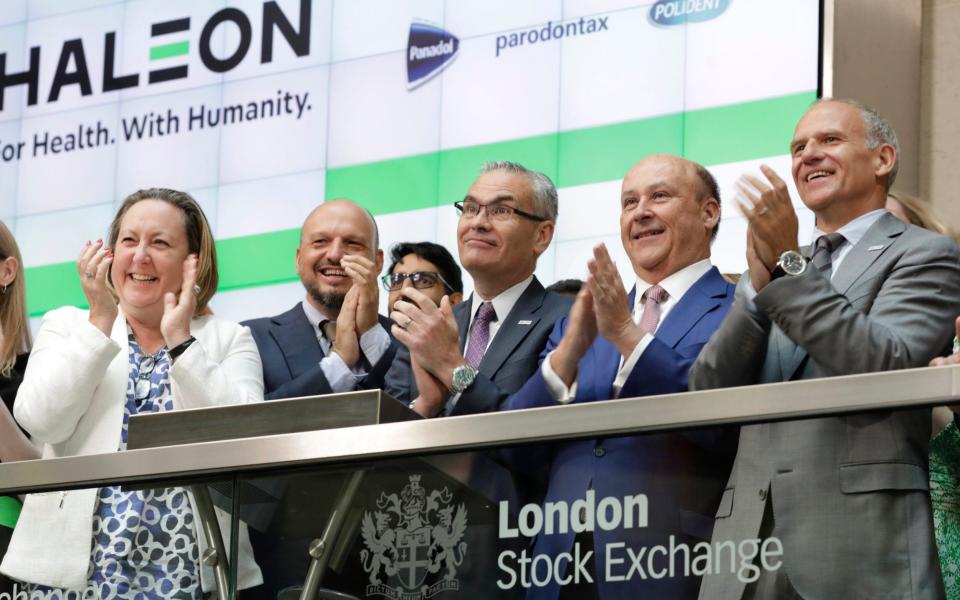
10:46 AM BST
Pound flat ahead of US interest rate decision
The pound was little changed against the dollar as investors wait to see what Federal Reserve chairman will say about the direction of interest rates later today.
Sterling was flat at just under $1.25 after recording its fourth consecutive monthly decline against the greenback amid signs that inflation is proving stubborn in the US.
The pound was down 0.1pc against the euro, which is worth 85p.
10:27 AM BST
Bitcoin slumps after worst month since 2022
Bitcoin slid by almost 6pc after April marked its worst monthly performance since late 2022, as investors pulled money out of cryptocurrencies ahead of an interest rate decision by the Federal Reserve later.
The value of the world’s most traded cryptocurrency fell by nearly 16pc in April, as investors booked profits on a sizzling rally that has taken the price to record highs above $70,000.
Bitcoin fell by as much as 5.6pc to its lowest since late February. It was last down 4.8pc at $57,001, while losses in ether were more modest, down 3.6pc at $2,857, also at its weakest since February.
The price of bitcoin is now a full 22pc below March’s record of $73,803, technically putting it in a bear market.
But it is still up 35pc so far this year and double where it was this time last year, thanks in large part to the billions of dollars flowing into newly minted exchange-traded funds since January.
Fineqia research analyst Matteo Greco said: “The recent downtrend can be attributed to increased profit-taking by investors who entered the market during the downturns of 2022 and 2023, as well as ETF investors who witnessed significant price appreciation on their shares after entering the market in the early weeks of 2024.”
10:11 AM BST
Economic recovery is fragile, say economists
The slump in manufacturing in April shows the fragility of Britain’s economic recovery, according to economists.
Tom Pugh, economist at RSM UK, said:
The economy is only just emerging from recession and although inflation will be back at the 2pc target soon, volatility in energy prices and strong growth in labour costs are good reminders that we aren’t out of the woods yet.
However, there are good reasons to expect spending on goods to improve over the next year.
He pointed to an expected rise in households’ real disposable incomes, slower price rises in retail and a recovering housing market.
Mike Thornton, national head of manufacturing at RSM UK, said April’s manufacturing decline was “likely to be a slight monthly blip”.
09:58 AM BST
Manufacturing ‘remains exposed to stubborn inflation’
As manufacturing output contracted in April, KPMG’s head of industrial products Glynn Bellamy, said:
Manufacturing recovery stagnated in April, as production levels and new orders fell back across the industry as a whole.
While manufacturers that are less exposed to the consumer downturn continue to fare better, all of the sector remains exposed to stubborn inflation.
This is being driven by higher input prices from the likes of logistics and raw materials costs.
The Bank of England will undoubtedly be keeping a close eye on this as part of its interest rate setting decisions.
09:42 AM BST
Inflation alarm bells ring as factory prices hit 14-month high
Britain’s manufacturing sector slipped back into a downturn last month, a closely-watched survey showed, as rising costs leave it struggling to emerge from the recession at the end of last year.
The S&P Global UK Manufacturing PMI - considered a key measure of growth in the private sector - fell to 49.1 in April, down from March’s 20-month high of 50.3. A figure below 50 indicates a contraction.
Average purchasing costs rose for the fourth successive month in April, with input price inflation hitting a 14-month high.
The figures present a headache for the Bank of England, with the weakness in the sector raising pressure to begin cutting interest rates, which derivatives trades on money markets indicate will only happen once this year.
However, rising cost inflation will add weight to arguments that interest rates need to remain higher.
A first rate cut is priced in to happen by November at the latest but money markets indicated just a month ago that it was expected to happen by August.
Rob Dobson, director at S&P Global, said:
The UK manufacturing sector suffered a renewed downturn in April, as output and new orders contracted following short-lived rebounds in March.
The sector is still besieged by weak market confidence, client destocking and disruptions caused by the ongoing Red Sea crisis, all of which are contributing to reduced inflows of new work from domestic and overseas customers, with specific reports of difficulty securing new contract wins from Europe, the US and Asia.”
The downturn is also sustaining cost caution at manufacturers, leading to lower employment, stock holdings and cutbacks in purchasing activity.
The news on the prices front is also worrisome for those looking for a sustainable path back to target (consumer price) inflation, with cost pressures growing in industry and feeding through to higher selling prices at the factory gate.
09:18 AM BST
Pictured: Palestine protesters blockade weapons factories
Protesters have formed blockades outside BAE Systems weapons factories as they call for a ceasefire in Gaza.
Demonstrators have gathered at a defence giant’s sites in Samlesbury, Lancashire, and at Govan in Glasgow as they urge an immediate end to the conflict between Israel and Hamas.


09:04 AM BST
FTSE 100 rises further after two months of gains
The FTSE 100 has edged higher as investors look ahead to the Federal Reserve’s policy decision later in the day for hints on when the US central bank will start cutting interest rates.
The blue-chip index was up 0.2pc, having recorded monthly gains of 2.4pc in April and 4.2pc in March.
Market activity is likely to be light with several European stock exchanges closed for Labour Day.
Investors are awaiting a new statement and comments from Federal Reserve chairman Jerome Powell that could give a clearer sense of how recent disappointing US inflation readings have changed the expectation for interest rate cuts this year.
Shares of GSK advanced 1.9pc after the drugmaker raised its full-year profit forecast and said its sales would be higher in the first six months of the year.
Dragging UK midcap stocks lower, shares of Aston Martin were last down 6.3pc after the luxury carmaker posted a bigger-than-expected first-quarter pretax loss.
The mid-cap FTSE 250 has slipped 0.1pc, which leaves it set for a second consecutive day of decline, if losses hold.
08:52 AM BST
Former Camelot boss to take helm at beleaguered Post Office
The former boss of previous National Lottery operator Camelot has been named as the new interim chairman of the Post Office.
Business Secretary Kemi Badenoch appointed Nigel Railton to the post, replacing Henry Staunton, who was sacked in January.
He later went on to claim she had told him he had to go because someone had to take the blame for the sub-postmaster scandal. However, an independent report found the former chairman of the Post Office was racist and sexist.
The Government said Mr Railton will take up the role at the state-owned Post Office “as soon as possible”, following pre-appointment checks.
He will take over an organisation in crisis, after more than 900 sub-postmasters and mistresses were wrongfully prosecuted as a result of the Horizon scandal, which saw the Post Office blame them for fictional shortfalls produced by faulty software.
Ms Badenoch said:
Nigel has the necessary experience to lead an organisation as large and complex as the Post Office and I’m confident he will work well with the leadership team to implement the change that is required in the organisation.
The Government is committed to delivering justice for the postmasters, but also fulfil our duties to Post Office staff.
I want to thank Nigel for stepping up to public service at a time of need, and I know he can help fix the issues of the past whilst transforming the company for the future.
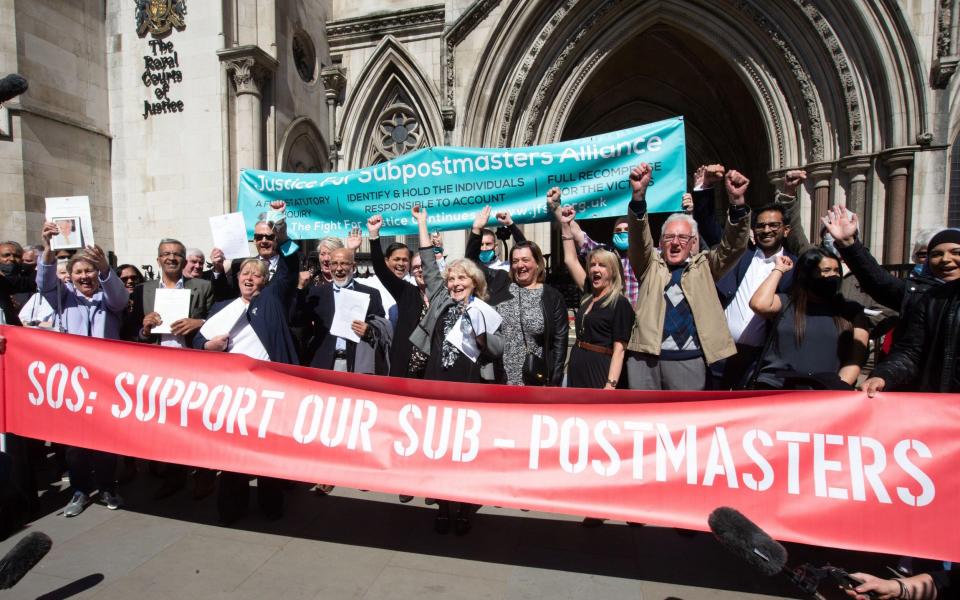
08:40 AM BST
GSK boosts profit outlook amid rising vaccine sales
GSK has raised its profit forecast for the year as it predicted higher sales from drugs to treat HIV, infectious diseases and respiratory conditions.
The pharmaceuticals giant said it expects core earnings per share to rise by as much as 10pc, having previously estimated 6pc to 9pc.
It revealed a 16pc increase in vaccine sale in the first three months of the year, led by its shingles vaccine Shingrix, which was up 18pc to £900m.
Chief executive Emma Walmsley said:
We have made a strong start to 2024, with another quarter of excellent performance and continued pipeline progress, including positive data read outs for 4 phase III medicines.
These, together with other R&D achievements, mean we have strengthened prospects for growth in all of our key therapeutic areas this quarter: infectious diseases, HIV, respiratory/immunology and oncology.
We expect this strong momentum to continue, and look forward to delivering another year of meaningful growth in sales and earnings in 2024.
Shares rose by 1.5pc in early trading.
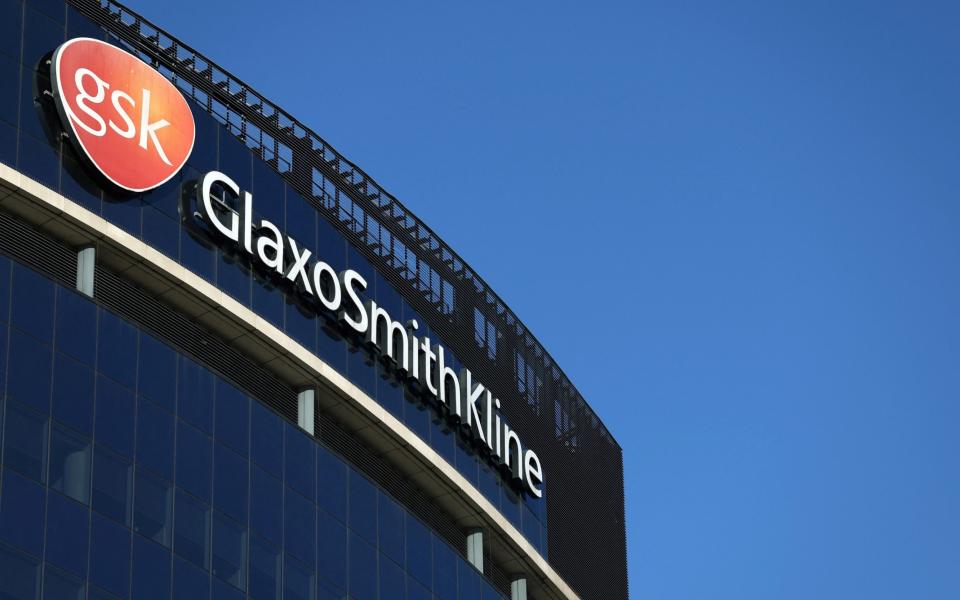
08:27 AM BST
House prices will pick up later this year, say estate agents
After the fall in house prices in the month to April, Knight Frank’s head of UK residential research Tom Bill said:
There are added financial pressures in the system as a wave of owners roll off sub-2pc mortgages agreed in early 2022.
We believe demand and house price growth will pick up later this year as a rate cut moves on to the horizon.
Jeremy Leaf, a north London estate agent, added:
We are not surprised by the small drop in property prices.
The increase in listings is resulting in more choice for buyers and some heavy negotiations on the ground which means only realistic sellers are proving successful.
However, underlying demand is much more resilient than it was a few months ago, coinciding with the stronger spring market.
08:07 AM BST
Aston Martin shares plunge as sales drop
Aston Martin shares fell heavily as trading began on the FTSE 250.
It dropped by 14pc after it revealed that losses nearly doubled in the first three months of the year as it sold more than a quarter fewer cars.
08:05 AM BST
FTSE 100 rises ahead of US rate decision
The FTSE 100 began the month higher ahead of the next interest rate decision by the US Federal Reserve.
The UK’s blue-chip index opened up 0.2pc to 8,160.5 on what will be a slow day of trading as many European markets are closed for holidays.
Meanwhile, the FTSE 250 dropped by 0.3pc to 19,914.11.
08:00 AM BST
Oil prices drop sharply amid ceasefire hopes
Oil prices have dropped at their fastest pace in three months amid increasing hopes for a ceasefire in Gaza.
Brent crude, the international benchmark, has fallen by 4.5pc over the last three days towards $85 a barrel in its steepest drop since late January.
Israel will consider joining ceasefire talks with Hamas when the militant group responds to the latest proposal for a temporary truce and hostage release, state-run Kan News reported.
Crude is starting May on the back foot after a rocky April that saw it surge to the highest since October following Iran’s unprecedented attack on Israel.
ANZ Banking Group analysts Brian Martin and Daniel Hynes said:
The potential for a ceasefire agreement between Israel and Hamas has eased concerns of an escalation of the conflict and any possible disruptions to supply.
Continued signs of inflation also raised concerns about demand for crude oil. This comes ahead of the US driving season, where demand for gasoline rises strongly.
07:55 AM BST
Aston Martin expects new models to boost sales
Aston Martin’s losses nearly doubled to £138.8m in the first quarter, as the luxury car maker slowed down production of several older car models ahead of a clutch of planned launches later this year.
The FTSE 250 company sold 945 cars in the three months to March 31, down by a quarter from 1,269 during the same period last year.
However, the car maker said it expects the new launches to boost its sales later in the year, with its new Vantage and DBX707 models due to start being delivered before the end of the second quarter.
Meanwhile, its flagship V12 and Special models will see deliveries start in the fourth quarter.
Executive chairman Lawrence Stroll said its first quarter performance “reflects this expected period of transition”.
07:48 AM BST
Aston Martin sales are worse than expected as new boss lined up
Aston Martin revealed sales dropped by more than a quarter at the start of the year as it poached the boss of rival Bentley to become its fourth chief executive in four years.
Revenues at the luxury car maker dropped by 10pc to £267.7m in the first three months of the year as it sold fewer vehicles, down 26pc to 945.
Analysts had forecast revenues of £290.4m and sales of 1,159 units. Operating losses worsened by 15pc to £58.7m.
Chairman Lawrence Stroll, the Canadian billionaire owner of the luxury British marque, said 2024 would be “a year of immense product transformation at Aston Martin”.
The company revealed last month that it has hired Adrian Hallmark to become its next chief executive from October.
Mr Hallmark, who will replace 78-year-old former Ferrari chief executive Amedeo Felisa, increased profits at Bentley 10-fold since before the pandemic.
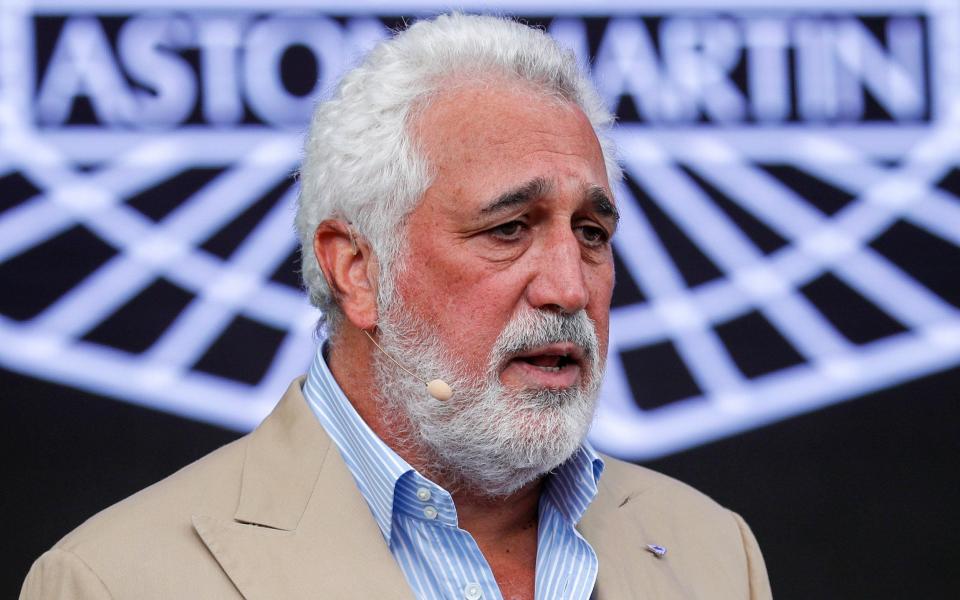
07:34 AM BST
Next warns of summer sales slump
High street giant Next has reported better-than-expected first quarter sales, but still expects early summer trading to slip after a warm weather boost last year.
The group said full-price sales rose by 5.7pc in the 13 weeks to April 27, ahead of its guidance for 5pc growth.
Despite the higher-than-forecast sales, it has kept its sales growth guidance for the first half at 2.5pc and retained its full year forecasts.
It said: “This implies that our sales in the second quarter will be down 0.3pc.
“We expect the sales performance in the second quarter to be weaker than the first quarter because last year benefited from particularly warm weather from late May through to the end of June.”
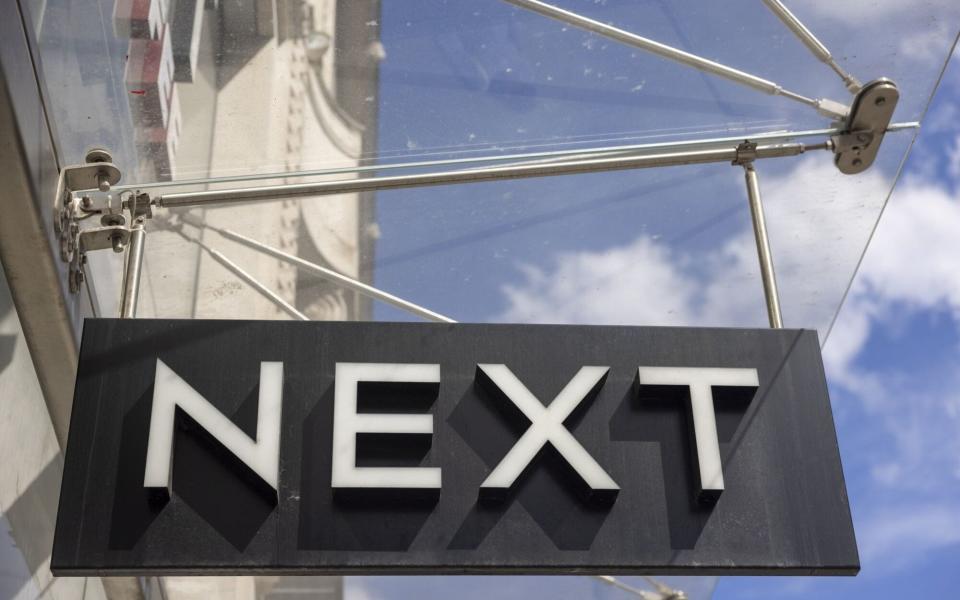
07:26 AM BST
Buyers are behaving cautiously amid rising rates, warn mortgage brokers
Buyers have become cautious amid rising mortgage rates, which has led to the slump in house prices, according to brokers.
Stephen Perkins, managing director at Yellow Brick Mortgages, said: “If you wanted evidence of how mortgage rates can impact the property market, this is it.
“Enquiries from buyers were bouyant in April, but many are holding off pulling the trigger and offering on properties.”
Ranald Mitchell, director at Charwin Private Clients, said: “Buyers are behaving cautiously at the moment so the fall in prices in April comes as no surprise.
“The ebullience at the start of the year has been slowly eroded as mortgage rates have edged up.”
Michelle Lawson, director at Lawson Financial, added: “Rising mortgage rates have injected uncertainty into the market over the past month or so.
“Though there is still demand, we need a base rate cut and a stamp duty incentive to kickstart the market and get things moving again.”
07:18 AM BST
House prices fall unexpectedly
House prices fell 0.4pc between March and April but had been forecast by economists to rise by 0.1pc.
On an annual basis, prices were 0.6pc higher compared to 1.6pc in March.
This was also worse than economist predictions of 1.2pc for the year to April.
The Nationwide House Price Index in the United Kingdom went down 0.4% month-on-month in March 2024, falling for the second consecutive month and against market expectations of a 0.2% rise. https://t.co/vsrbvuA0vN pic.twitter.com/AQSpHxbffG
— TRADING ECONOMICS (@tEconomics) May 1, 2024
07:11 AM BST
Buyers are still positive, insist estate agents
Estate agents have shrugged off the latest house price index from Nationwide showing house prices fell for a second consecutive month between March and April.
Sam Mitchell, chief executive of Purplebricks, said:
There is still positive sentiment from buyers and we are seeing viewing activity increase, signalling stability in the housing market.
While several banks have slightly increased mortgage rates, there has also been an increase in new market offerings, both have sparked buyers into action which has resulted in more sales.
The Bank of England has just announced mortgage rate approvals are at an all time high and people will want to capitalise on this.
Matt Thompson, head of sales at Chestertons, said: “The uplift in market activity typically associated with spring was slightly delayed this year but became more evident over the course of April.
“Compared to March, we saw an increase in the number of London house hunters which also led to sellers feeling more confident about putting their property up for sale.”
07:06 AM BST
House prices suffer unexpected slump amid rising mortgage rates
House prices fell for a second month in a row as mortgage lenders put up rates, according to a closely-watched survey.
Property values dropped by 0.4pc between March and April, the Nationwide house price index showed, below economists forecasts for a 0.1pc gain.
The average home was worth £261,962, which was 0.6pc higher than the same month last year, a slowdown from the 1.6pc annual increase recorded in March.
Nationwide’s chief economist Robert Gardner said: “The slowdown likely reflects ongoing affordability pressures, with longer term interest rates rising in recent months, reversing the steep fall seen around the turn of the year.
“House prices are now around 4pc below the all-time highs recorded in the summer of 2022, after taking account of seasonal effects.”
Lenders have been putting up borrowing costs, with the number of mortgages with rates of over 6pc rising by 10pc since the start of last month, according to analyst Moneyfacts.
Major lenders including TSB, Halifax and HSBC have increased prices on a selection of their mortgages over the past two weeks as swap rates - the main pricing mechanism for home loans - have continued to rise.
Mr Gardner added:
Recent research carried out by Censuswide on behalf of Nationwide found that nearly half (49pc) of prospective first-time buyers (those looking to buy in the next five years) have delayed their plans over the past year.
Among this group, the most commonly cited reason for delaying their purchase is that house prices are too high (53pc), but it is also notable that 41pc said that higher mortgage costs were preventing them from buying.
Coupled with this, 84pc of prospective first-time buyers said that the cost of living has affected their plans to buy, for example through having less money each month to save for a deposit.
Around two thirds (67pc) of respondents currently have between £0 and £10,000 saved towards a deposit.
With a 10pc deposit on a typical first-time buyer property currently around £22,000, it is not surprising to find that c.60pc of prospective buyers have yet to save more than a quarter of their target deposit.
Interestingly, 55pc of respondents said they would be willing to buy in another part of the country where house prices are cheaper, or where they could buy a bigger property. Inevitably, there is a lot of variation in how far people would be willing to move, but half said they would move more than 30 miles from their current location.
Buying a property in a less expensive area appears to be the most common compromise that prospective buyers will make. Around a third (32pc) said they would consider a smaller property than they wanted, while 28pc would go for a property that needed work doing.
07:02 AM BST
Good morning
Thanks for joining me. House prices fell by 0.4pc in April compared to March, according to the lender Nationwide.
A typical home was worth £261,962 which was up 0.6pc compared to the same time last year.
5 things to start your day
1) HSBC plunged into succession battle as chief executive quits | Noel Quinn to step down during politically delicate period for global bank
2) Lithium miner submits plans to drill in Durham | Renewable energy storage and EVs drive demand for domestic lithium supply
3) Musk deepens ‘hardcore’ job cuts at Tesla | Billionaire calls for anyone not ‘excellent, necessary and trustworthy’ to be axed amid race to control costs
4) Amazon shrugs off China threat to post record start to year | Amazon executives are increasingly focusing their attention on competition from Chinese shopping sites
5) Slavery did not make Britain rich, finds report | New book reveals colonialism delivered only ‘modest gains’ amid debate over reparations
What happened overnight
Asian stocks fell with most of the markets in the region closed for a holiday. Meanwhile, US stocks closed out their worst month since September.
Tokyo’s Nikkei 225 index lost 0.8pc, down to 38,089.09 in early trading after the country’s factory activity experienced a milder shrink in April, as the manufacturing purchasing managers’ index from au Jibun Bank rose to 49.6 in April from 48.2 in March.
A PMI reading under 50 represents a contraction, and a reading of 50 indicates no change.
The yen continues to struggle. On Wednesday, the US dollar rose to 157.89 Japanese yen from 157.74 yen.
Australia’s S&P/ASX 200 dipped 1.2pc to 7,574.20. Other markets in the region were closed due to the Labor Day holiday.
In America, the S&P 500 tumbled 1.6pc to cement its first losing month in the last six. Its momentum slammed into reverse in April, falling as much as 5.5pc at one point, after setting a record at the end of March.
Meanwhile, the Dow Jones Industrial Average dropped 1.5pc, and the Nasdaq Composite index lost 2pc.
The yield on benchmark 10-year US Treasury bonds rose to 4.68pc from 4.61pc just before yesterday’s release of data on employee wages and benefits.

 Yahoo Finance
Yahoo Finance 